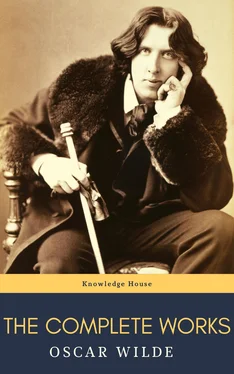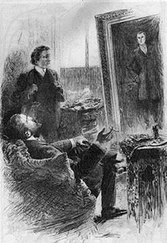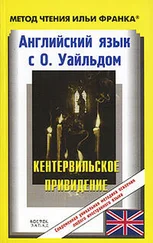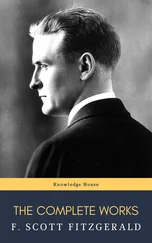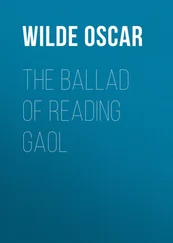He would destroy it. Why had he kept it so long? It had given him pleasure once to watch it changing and growing old. Of late he had felt no such pleasure. It had kept him awake at night. When he had been away, he had been filled with terror lest other eyes should look upon it. It had brought melancholy across his passions. Its mere memory had marred many moments of joy. It had been like conscience to him. Yes, it had been conscience. He would destroy it.
He looked round, and saw the knife that had stabbed Basil Hallward. He had cleaned it many times, till there was no stain left upon it. It was bright, and glistened. As it had killed the painter, so it ·100· would kill the painter’s work, and all that that meant. It would kill the past, and when that was dead he would be free. He seized it, and stabbed the canvas with it, ripping the thing right up from top to bottom.
There was a cry heard, and a crash. The cry was so horrible in its agony that the frightened servants woke, and crept out of their rooms. Two gentlemen, who were passing in the Square below, stopped, and looked up at the great house. They walked on till they met a policeman, and brought him back. The man rang the bell several times, but there was no answer. The house was all dark, except for a light in one of the top windows. After a time, he went away, and stood in the portico of the next house and watched.
“Whose house is that, constable?” asked the elder of the two gentlemen.
“Mr. Dorian Gray’s, sir,” answered the policeman.
They looked at each other, as they walked away, and sneered. One of them was Sir Henry Ashton’s uncle.
Inside, in the servants’ part of the house, the half-clad domestics were talking in low whispers to each other. Old Mrs. Leaf was crying, and wringing her hands. Francis was as pale as death.
After about a quarter of an hour, he got the coachman and one of the footmen and crept up-stairs. They knocked, but there was no reply. They called out. Everything was still. Finally, after vainly trying to force the door, they got on the roof, and dropped down on to the balcony. The windows yielded easily: the bolts were old.
When they entered, they found hanging upon the wall a splendid portrait of their master as they had last seen him, in all the wonder of his exquisite youth and beauty. Lying on the floor was a dead man, in evening dress, with a knife in his heart. He was withered, wrinkled, and loathsome of visage. It was not till they had examined the rings that they recognized who it was.
the end.
The Picture
of
Dorian Gray.
by
Oscar Wilde
London: Ward, Lock and Co.
July 1891
[The text follows
the first book edition.]
contents.
The Preface.
I. II. III. IV. V.
VI. VII. VIII. IX. X.
XI. XII. XIII. XIV. XV.
XVI. XVII. XVIII. XIX. XX.
The artist is the creator of beautiful things.
To reveal art and conceal the artist is art’s aim.
The critic is he who can translate into another manner or a new material his impression of beautiful things.
The highest as the lowest form of criticism is a mode of autobiography.
Those who find ugly meanings in beautiful things are corrupt without being charming. This is a fault.
·vi· Those who find beautiful meanings in beautiful things are the cultivated. For these there is hope.
They are the elect to whom beautiful things mean only Beauty.
There is no such thing as a moral or an immoral book. Books are well written, or badly written. That is all.
The nineteenth century dislike of Realism is the rage of Caliban seeing his own face in a glass.
The nineteenth century dislike of Romanticism is the rage of Caliban not seeing his own face in a glass.
The moral life of man forms part of the subject-matter of the artist, but the morality of art consists in the perfect use of an imperfect medium.
No artist desires to prove anything. Even things that are true can be proved.
No artist has ethical sympathies. An ethical sympathy in an artist is an unpardonable mannerism of style.
No artist is ever morbid. The artist can express everything.
Thought and language are to the artist instruments of an art.
Vice and virtue are to the artist materials for an art.
From the point of view of form, the type of all the arts is the art of the musician. From the ·vii· point of view of feeling, the actor’s craft is the type.
All art is at once surface and symbol.
Those who go beneath the surface do so at their peril.
Those who read the symbol do so at their peril.
It is the spectator, and not life, that art really mirrors.
Diversity of opinion about a work of art shows that the work is new, complex, and vital.
When critics disagree the artist is in accord with himself.
We can forgive a man for making a useful thing as long as he does not admire it. The only excuse for making a useless thing is that one admires it intensely.
All art is quite useless.
Oscar Wilde.
The studio was filled with the rich odour of roses, and when the light summer wind stirred amidst the trees of the garden there came through the open door the heavy scent of the lilac, or the more delicate perfume of the pink-flowering thorn.
From the corner of the divan of Persian saddlebags on which he was lying, smoking, as was his custom, innumerable cigarettes, Lord Henry Wotton could just catch the gleam of the honey-sweet and honey-coloured blossoms of a laburnum, whose tremulous branches seemed hardly able to bear the burden of a beauty so flame-like as theirs; and now and then the fantastic shadows of birds in flight flitted across the long tussore-silk curtains that were stretched in front of the huge window, producing a kind of momentary Japanese effect, ·2· and making him think of those pallid jade-faced painters of Tokio who, through the medium of an art that is necessarily immobile, seek to convey the sense of swiftness and motion. The sullen murmur of the bees shouldering their way through the long unmown grass, or circling with monotonous insistence round the dusty gilt horns of the straggling woodbine, seemed to make the stillness more oppressive. The dim roar of London was like the bourdon note of a distant organ.
In the centre of the room, clamped to an upright easel, stood the full-length portrait of a young man of extraordinary personal beauty, and in front of it, some little distance away, was sitting the artist himself, Basil Hallward, whose sudden disappearance some years ago caused, at the time, such public excitement, and gave rise to so many strange conjectures.
As the painter looked at the gracious and comely form he had so skilfully mirrored in his art, a smile of pleasure passed across his face, and seemed about to linger there. But he suddenly started up, and, closing his eyes, placed his fingers upon the lids, as though he sought to imprison within his brain some curious dream from which he feared he might awake.
“It is your best work, Basil, the best thing you have ever done,” said Lord Henry, languidly. “You must certainly send it next year to the Grosvenor. The Academy is too large and too vulgar. Whenever ·3· I have gone there, there have been either so many people that I have not been able to see the pictures, which was dreadful, or so many pictures that I have not been able to see the people, which was worse. The Grosvenor is really the only place.”
“I don’t think I shall send it anywhere,” he answered, tossing his head back in that odd way that used to make his friends laugh at him at Oxford. “No: I won’t send it anywhere.”
Lord Henry elevated his eyebrows, and looked at him in amazement through the thin blue wreaths of smoke that curled up in such fanciful whorls from his heavy opium-tainted cigarette. “Not send it anywhere? My dear fellow, why? Have you any reason? What odd chaps you painters are! You do anything in the world to gain a reputation. As soon as you have one, you seem to want to throw it away. It is silly of you, for there is only one thing in the world worse than being talked about, and that is not being talked about. A portrait like this would set you far above all the young men in England, and make the old men quite jealous, if old men are ever capable of any emotion.”
Читать дальше
